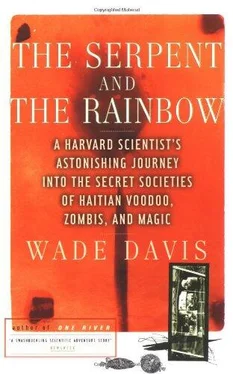Wade Davis - The Serpent and the Rainbow
Здесь есть возможность читать онлайн «Wade Davis - The Serpent and the Rainbow» весь текст электронной книги совершенно бесплатно (целиком полную версию без сокращений). В некоторых случаях можно слушать аудио, скачать через торрент в формате fb2 и присутствует краткое содержание. Год выпуска: 1985, Издательство: Simon & Schuster, Жанр: Старинная литература, на английском языке. Описание произведения, (предисловие) а так же отзывы посетителей доступны на портале библиотеки ЛибКат.
- Название:The Serpent and the Rainbow
- Автор:
- Издательство:Simon & Schuster
- Жанр:
- Год:1985
- ISBN:нет данных
- Рейтинг книги:5 / 5. Голосов: 1
-
Избранное:Добавить в избранное
- Отзывы:
-
Ваша оценка:
- 100
- 1
- 2
- 3
- 4
- 5
The Serpent and the Rainbow: краткое содержание, описание и аннотация
Предлагаем к чтению аннотацию, описание, краткое содержание или предисловие (зависит от того, что написал сам автор книги «The Serpent and the Rainbow»). Если вы не нашли необходимую информацию о книге — напишите в комментариях, мы постараемся отыскать её.
The Serpent and the Rainbow — читать онлайн бесплатно полную книгу (весь текст) целиком
Ниже представлен текст книги, разбитый по страницам. Система сохранения места последней прочитанной страницы, позволяет с удобством читать онлайн бесплатно книгу «The Serpent and the Rainbow», без необходимости каждый раз заново искать на чём Вы остановились. Поставьте закладку, и сможете в любой момент перейти на страницу, на которой закончили чтение.
Интервал:
Закладка:
I felt lucky to have Rachel with me. Like a child set loose in a carnival, she delighted in the landscape and took pleasure in pointing out things I could not have seen, let alone understood—all the incidental visual anecdotes that for her somehow formed a whole. Yet she herself seemed such a mix of lives. The night before I had sat at the peristyle transfixed by the magic of her and the other hounsis; now as we spoke—and we did continuously—I realized that she was also a high school senior, and an American one at that. Rachel, in fact, had been born in the United States and had spent the first ten years of her life in Massachusetts. Her family, once back in Haiti, and with an eye to her future university education, had enrolled her in the private school run for all the English-speaking children of the foreign diplomatic community. Hence, as we traveled north to try to obtain a poison from Marcel Pierre, our conversation ran from zombis to high school yearbooks, proms, college admission boards, and back to the loa. I don’t know if she noticed how strange it all seemed to me. Perhaps she was thinking the same thing.
“What do you do for a living?” she asked at one point.
“Mainly, I’m an ethnobotanist.”
“What’s that?”
“Somewhere between an anthropologist and a biologist. We try to find new medicine from plants.”
“Have you found any?”
“No.” I laughed.
“I’d like to study anthropology, or literature. But I think I like anthropology better.”
“So do I. You get tired of just books.”
“I already am.” She was looking out the windshield watching the slopes of the mountains that loomed above the coastal road. “Somewhere around here a friend of my father saw a ball of fire come out a cave,” she said.
Saint Marc was still. In the white heat of midday, not even a dog ventured forth. The pallid luster of haze shimmered at the ends of long dusty streets. Buildings of brick and wood, ravaged by time, stood braced by the surrounding hills, scabrous and stripped of vegetation, and mile after mile of featureless hills rose to distant mountains trapped by the horizon.
Rachel’s aunt had been the mayor of Saint Marc, but we didn’t need her help to locate Marcel Pierre. He was well known. A mechanic pointed out a bar and dry goods store at the northern end of town in an area known as the Wasp’s Gate. Marcel Pierre owned the Eagle Bar, as the place was called. Behind it he had built his hounfour.
In the shadowy doorway of the bar a Dominican woman leaned on a Wurlitzer, apparently inured to the raucous music that even at this time of day poured from the machine. Rachel greeted her. The woman motioned us to a table on the porch, then turned and left, trailing the sour scent of cheap perfume. The music was unbearable, we agreed, and we got up to venture inside. The rear of the bar was divided into a number of dark and dingy cubicles, each no longer than the straw mat on its floor, each with a crudely drawn number on its door. A single unshaded light bulb hung from the ceiling. I imagined the place by night, a small labyrinth of cells, each inhabited by a soft, pliant body.
A young boy appeared, and after a brief exchange with Rachel he led us out the back of the bar, past a number of small houses, and through a gate of rusted tin that marked the entrance of the hounfour. He knocked three times. Marcel Pierre emerged from his temple with a woman. She was short and languid. He was tall, with muscles that moved at bone level, and below his flat face, hidden by dark glasses, his thorax stood out in bold relief. He wore red, and a golf cap bearing the emblem of a manufacturer of insecticides.
As we had agreed on the drive, Rachel introduced me as a representative of powerful interests in New York who were willing to pay generously for his services provided no questions were asked and my instructions were followed precisely. He was not impressed. He fixed us with a long disconcerting stare, and when he began to speak he held his head stiffly as if conversing through an imaginary intermediary. He seemed uncommonly calm, and it soon became clear that his only concern was money—how much and how soon.
I asked to see a sample of the reputed zombi poison, and he led us into his bagi , the inner sanctum of the temple. An altar piled deep with artifacts took up most of the room. Displayed prominently among the brilliantly colored powders, the rum and wine bottles, the playing cards, feathers, heads, and Roman Catholic lithographs, were a doll’s head and three skulls, one of them dog and two human. On the wall was a swollen carcass of a puffer fish, a sisal whip, and a staff decorated with horizontal bands of light and dark wood. Marcel reached into the pile on the altar and brought out a plastic bag containing a white aspirin bottle. From a ketchup bottle he poured an oily emulsion onto his hands and rubbed all exposed parts of his body, then instructed us to do the same. The potion smelled of ammonia and formaldehyde. Next, having wrapped a red cloth around his nose and mouth, he carefully opened the bottle. Inside was a coarse, light brown powder. Marcel stood back from the altar, and placidly lifted the red cloth from the left side of his face to reveal a mottled scar. This, he suggested, was proof of the powder’s efficacy.
The negotiations began. He presented me with what amounted to a grocery list—so much for the zombi, so much for the poison, so much to dig up the necessary bones in the cemetery, so much for all three. His brusque offer, void of mystique, left me neither hopeful nor suspicious. By now, after but forty-eight hours in Haiti, I was becoming aware that in this surrealistic country anything might be possible. I merely insisted on certain conditions. I would pay him the negotiated price for the poison provided that I would be able to observe the entire process and collect raw samples of each ingredient. He hesitated, but then agreed. I told him that within twenty-four hours I would let him know if we needed any of his other services.
That evening when I was back with Rachel at the Peristyle de Mariani, I discussed Marcel’s various propositions at some length with her father, Max. He assured me that an individual made into a zombi could be readily treated by a houngan. His confidence combined with my own skepticism that zombis even existed persuaded me to push Marcel Pierre as far as he would go. I would have a look at his poison, and if it was promising, other possibilities might follow.
We returned early the next morning, and Marcel Pierre took us to the local military post to request permission to enter the graveyard to dig up bones. This was denied, not for ethical reasons but because I had failed to obtain the necessary papers from the capital. Marcel suggested to me that we forget about obtaining fresh material from the cemetery and instead use some bones he had on hand at his temple. I agreed, and the three of us spent the rest of the morning assembling the various ingredients of the reputed poison. From an old apothecary we bought several packets of brightly colored talc—magical potions with such exotic names as “break wings,” “cut water,” “respect the crossroads.” Then we drove north to a barren scrubland to gather leaves. We were back at the hounfour that afternoon, and beneath the thatch shelter of his peristyle Marcel Pierre prepared his zombi poison. He first ground the leaves in a mortar, then grated a human skull, adding the shavings to the mortar along with the miscellaneous packets of talc. It seemed a desultory process, his moving from task to task laboriously like an insect, drooping his shoulder with each step. It was near the end of the afternoon when he handed me a dark green powder, finely sifted and sealed in a glass jar.
Rachel cracked open the tin cap of a rum bottle, tipping it lightly to the ground three times to feed the loa. Marcel nodded approvingly. In between long swigs of rum I mentioned to Marcel that I planned to test the poison on an enemy I had, a white foreigner living in the capital, and that I would be certain to let him know the results. I thanked him profusely and paid him the substantial sum I had promised, plus a sizable bonus. I left his hounfour certain that he knew how to make the zombi poison. I was equally convinced that what he had made me was worthless.
Читать дальшеИнтервал:
Закладка:
Похожие книги на «The Serpent and the Rainbow»
Представляем Вашему вниманию похожие книги на «The Serpent and the Rainbow» списком для выбора. Мы отобрали схожую по названию и смыслу литературу в надежде предоставить читателям больше вариантов отыскать новые, интересные, ещё непрочитанные произведения.
Обсуждение, отзывы о книге «The Serpent and the Rainbow» и просто собственные мнения читателей. Оставьте ваши комментарии, напишите, что Вы думаете о произведении, его смысле или главных героях. Укажите что конкретно понравилось, а что нет, и почему Вы так считаете.












